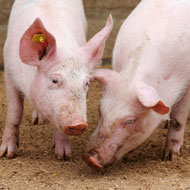‘Worrying escalation’ of swine dysentery cases, NPA says

NPA said the cases continue the ‘worrying escalation’ of outbreaks in recent weeks.
The National Pig Association (NPA) is calling for increased biosecurity on pig farms after four new cases of swine dysentery were confirmed in one day last week.
Three cases were detected in North Yorkshire, one on a finisher unit, while a fourth case was identified on a finishing unit in Gloucestershire on 22 March.
Strict biosecurity and bio-containment measures are in place and treatment is ongoing at the units. One of the units is said to be ‘responding well’ to treatment. The origin of the outbreaks is not known, but investigations are underway, according to AHDB.
NPA said the cases continue the ‘worrying escalation’ of outbreaks in recent weeks. The association is warning farmers who have recently moved pigs from North Yorkshire to monitor them closely for the development of clinical signs.
AHDB stressed the importance of enhanced biosecurity and monitoring for clinical signs over the next few weeks, particularly in North Yorkshire and Gloucestershire.
Earlier this month, AHDB reported three outbreaks across three different counties in the north and east of the country over a period of two weeks.
Click here for NPA guidance on biosecurity measures.



 RCVS Knowledge has welcomed Professor Peter Cockcroft as editor-in-chief for Veterinary Evidence.
RCVS Knowledge has welcomed Professor Peter Cockcroft as editor-in-chief for Veterinary Evidence.